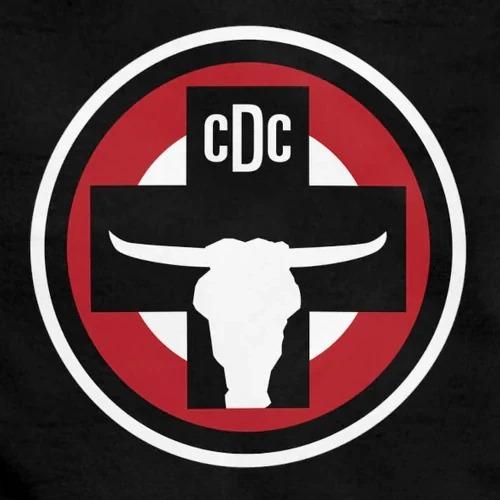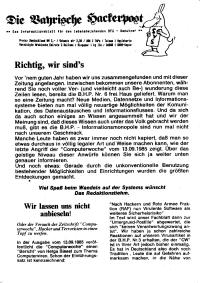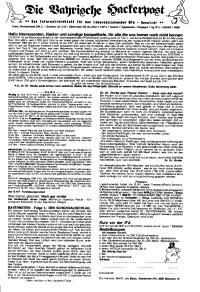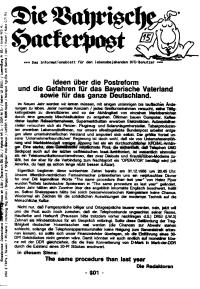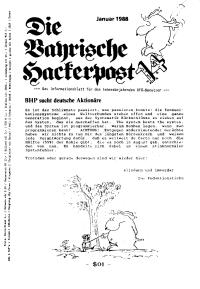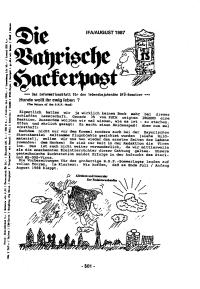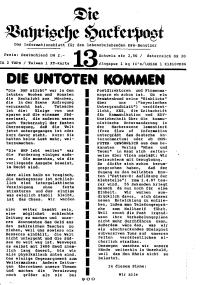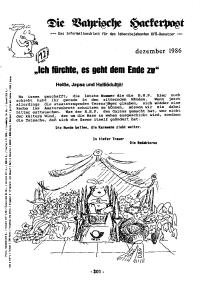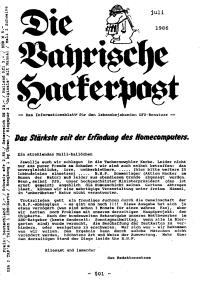Copy Link
Add to Bookmark
Report
Netizens-Digest Volume 1 Number 238

Netizens-Digest Wednesday, January 6 1999 Volume 01 : Number 238
Netizens Association Discussion List Digest
In this issue:
[netz] Re: who regulates ISP? (fwd)
[netz] Re: who regulates ISP? (fwd)
[netz] Re: [ifwp] Jan. 23 Berkman Ctr workshop on ICANN membership issues
[netz] Re: [ifwp] Re: Jan. 23 Berkman Ctr workshop on ICANN membership issues
Re: [netz] ICANN
[netz] seeking considered opinions...got any? (fwd)
Re: [netz] ICANN
----------------------------------------------------------------------
Date: Tue, 5 Jan 1999 12:52:06 -0800 (PST)
From: Greg Skinner <gds@best.com>
Subject: [netz] Re: who regulates ISP? (fwd)
- ------- start of forwarded message -------
Path: news3.best.com!news1.best.com!peerfeed.ncal.verio.net!jupiter.dnai.com!ultra.sonic.net!not-for-mail
From: Scott Doty <no-spam@sonic.net>
Newsgroups: ba.internet
Subject: Re: who regulates ISP?
Date: 4 Jan 1999 04:51:21 GMT
Organization: Sonic,Santa Rosa CA,http://www.sonic.net
Lines: 53
Message-ID: <76phc9$kae$1@ultra.sonic.net>
References: <765vt8$bkn$1@nnrp1.crl.com> <36879e5a.19932083@supernews.sirius.com> <76d3ro$oum$1@ultra.sonic.net> <368c58a4.1968977@supernews.sirius.com>
NNTP-Posting-Host: pengo
User-Agent: tin/pre-1.4-971224 (UNIX) (Linux/2.0.34 (i686))
Xref: news3.best.com ba.internet:39424
trebor@sirius.com wrote:
> Scott Doty <no-spam@sonic.net> wrote:
>>trebor <drg@pgh.org> wrote:
>>> And just in case someone told you different, ISPs are NOT common carriers.
>>
>>What differentiates ISPs from common carriers?
> The status of such granted by the US Government.
This is a difficult definition -- if only because there were common
carriers before there was a US.
> Now, you might say that what ISPs do (or should do) is very similar to
> what a common carrier does, and I'll probably agree. But that's not
> enough.
I suggest that the Bell monopoly was explicitly described as a "common
carrier" precisely because they were regulated; and that through the years,
this designation remained explicit as a result of that regulation.
> No ISP has been granted common carrier status, afaik. If anyone knows
> otherwise, please post.
Well, this goes back to the definition of "common carrier" -- is this
a status _granted_ by a government, or is it a _property_ of a company
that acts in a certain way?
For instance, consider the case of _Cubby vs. Compuserve_ -- this
illustrated that their "hands-off" policy with regard to content protected
Compuserve from liability (and, by extension, companies with similar
policies.)
ISP's rally around that decision because, dangit, that's a sensible stance.
How could an ISP hope to monitor and control all content? The only scalable
solution is to remain "hands-off," thus _pretending_ that they are common
carriers. (There have been exceptions, but I daresay most ISP's follow
this model.)
And so, considering that this is a term wrought from English shipping law,
(and from a time before the US revolutionary war), I can't see how
"pretending" to be a common carrier wouldn't earn a company this
designation. Except one point: that US law (since sometime after 1934)
seems to consider this designation explicit, and not a property manifest
by a company's policy.
My conclusion, then: ISP's that pursue a "hands-off" policy are,
semantically, common carriers. They do so because they recognize the
principal, even if it hasn't been explicitly recognized by the US
government. If folks choose to regard "common carrier" as a description
bestowed by their government, that's fine -- because ISP's can see that
"pretending" to be a common carrier gives them the same advantages.
-Scott
- ------- end of forwarded message -------
------------------------------
Date: Tue, 5 Jan 1999 12:53:53 -0800 (PST)
From: Greg Skinner <gds@best.com>
Subject: [netz] Re: who regulates ISP? (fwd)
- ------- start of forwarded message -------
Path: news3.best.com!nntp1.ba.best.com!not-for-mail
From: dillon@best.net (Matt Dillon)
Newsgroups: ba.internet
Subject: Re: who regulates ISP?
Date: 3 Jan 1999 23:33:38 -0800
Organization: BEST Internet Communications, Inc. www.best.com
Message-ID: <76pqsi$gmg$1@flea.best.net>
References: <F50vzv.CnF@zorch.SF-Bay.ORG>
Lines: 52
NNTP-Posting-Host: flea.best.net
X-Trace: nntp1.ba.best.com 915435283 19091 dillon@206.184.139.131
Xref: news3.best.com ba.internet:39429
:In article <F50vzv.CnF@zorch.SF-Bay.ORG>,
:Scott Hazen Mueller <scott@zorch.SF-Bay.ORG> wrote:
:>In the quoted message, 'From: Scott Doty <no-spam@sonic.net>' wrote:
:>>> No ISP has been granted common carrier status, afaik. If anyone knows
:>>> otherwise, please post.
:>
:>>Well, this goes back to the definition of "common carrier" -- is this
:>>a status _granted_ by a government, or is it a _property_ of a company
:>>that acts in a certain way?
:>
:>ISPs act as if they are common carriers because the best advice to date has
:>been that the courts will find them to be common carriers. However, no
:>significant case law has been developed in this area - Cubby v. Compuserve and
:>the Prodigy case do draw important distinctions, but neither is conclusive,
:>and neither went to the Supreme Court. There is no automatic common carrier
:>status for ISPs - in the absence of actual legislation or case law, ISPs
:>aren't guaranteed that level of protection. It's good to remember that ISPs
:>are only one act of Congress away from having no common carrier protection at
:>all.
:>
:> \scott
This may be so, but it isn't very realistic. Most of the larger ISPs have
already been sued dozens of times. Hell, BEST has been sued at least a
dozen times in the last 5 years. We have never lost -- most of the
suits try to name us as codefendants with a user who has broken the law
(usually porn-related). Most of the time, the judge removes us from the
case almost immediately. While ISPs do not have an official common-carrier
status, most of these suits touch on the same principles the ISPs have
always won in cases where they've followed appropriate business practices.
The only cases ISPs have lost in the last 5 years have been those relating
to forums under editorial control. Only CompuServe and AOL had these
sorts of forums and I believe only CompuServe ever lost a related case
that I know of. Both have since adjusted their business practices and are
now very well protected.
Please don't assume that there are only a few court cases. Sure none
have gotten to the supreme court but that's because the LAW has pretty
much decided with the ISPs so strongly that no lawyer bothers appealing
the cases because they know they will lose. Most ISPs I know have been
sued at least once, an the larger ones have been sued many times... and
the ISPs always win those sorts of cases. The reality is that ISPs are
quite well protected as long as they follow reasonable business practices.
-Matt
- --
Matthew Dillon Engineering, HiWay Technologies, Inc. & BEST Internet
Communications
<dillon@best.net> (Please include original email in any response)
- ------- end of forwarded message -------
------------------------------
Date: Wed, 6 Jan 1999 01:10:51 -0500 (EST)
From: Ronda Hauben <ronda@panix.com>
Subject: [netz] Re: [ifwp] Jan. 23 Berkman Ctr workshop on ICANN membership issues
Jonathan Zittrain <zittrain@cyber.law.harvard.edu> wrote:
Good to see this posting as a few people have mentioned they
were planning to go to Cambridge on January 23, but I couldn't
find any explanation of what was happening then or who it
was open to.
Is the meeting open to anyone who comes, or is there a need to
let someone know if one plans to attend?
>Workshop on Membership Issues for ICANN
>January 23, 1999
>The Berkman Center for Internet & Society at Harvard Law School is convening a
>workshop on Saturday, January 23, 1999 in Cambridge, Massachusetts, U.S.A., in
>conjunction with its study of possible membership structures for the Internet
>Corporation for Assigned Names and Numbers (ICANN).
It seems especially important that there be some presentation
and discussion of the Internet and its unique nature.
Do you plan any such discussion?
I will have a paper by then that I could contribute.
>The workshop will feature discussion of membership structures for existing
>organizations that have confronted aspects of the membership
>issues ICANN is facing. It will also feature moderated Socratic panel
>discussions.
But the Internet is *not* an existing organization but a unique
new medium of worldwide communication.
That is why it seems especially important to have discussion
of the unique nature of the Internet to determine whether
the membership structures you will be considering are appropriate
for this unique new medium.
The Federal District Court in the CDA case (and in a decision
affirmed by the U.S. Supreme Court) said that one needed
to consider the unique nature of this new medium before being
able to determine what was appropriate for it.
>The Berkman Center welcomes public attendance and electronic participation via
>the submission of written questions, ideas or
>proposals. Comments can be submitted to rcs@cyber.law.harvard.edu or by postal
>mail to:
Do I have to submit this suggestion to that email as well?
I will do so.
>RCS/Berkman Center for Internet & Society at Harvard Law School
>Pound Hall 511
>1563 Massachusetts Avenue
>Cambridge, MA 02138 U.S.A.
>In addition, Berkman Center staff are actively subscribed to domain
>name/assigned numbers discussion lists such as IFWP, ORSC, and Internic's
>domain-policy.
There doesn't seem to be a list involved that takes up the concerns
of the noncommercial Internet community and users.
Are you making any effort to include this large segment of the
Internet as part of your work?
The fact that I didn't originally even receive a reply to my
statement of interest in the membership support organization,
and after complaining that no one notified me of the action on
my application I was told that there had been a slip up. Then
when I complained that it didn't seem my statement of interest
had been considered, I was told that there were others from other
regions that had to be included so I couldn't be.
This is the danger of "representation" and of any form of exclusive
or selective membership. It seems that those
without a commercial interest in the Internet are being actively
excluded from the whole ICANN process, and when one complains
about this, one is told effectively that this is because there
are those with a commercial interest in the Internet and its
future in other regions of the world and they have to be included
so don't expect to be.
In the research I have done about the early development of the
Internet, I came across a situation where the U.S. postal
service was having a hearing on what should happen with regard
to email and the postal service. The consultant involved with
that meeting said that too often public meetings were attended
only by those with a commercial interest in the issues being
decided. That he was especially interested in hearing from
those who did *not* have a commercial interest in the issues
under discussion.
In the creation and development of ICANN by the U.S. government
the opposite principle is in effect.
Essentially only those with a commercial interest or who
are willing to represent commercial interests are allowed
to be involved.
And there is a principle of actively excluding those without
a commercial interest.
Thus the great majority of those who communicate via the
Internet being disenfrachised.
And the great majority of those who contribute to and make
the Internet into the important and unique means of
global communication are being disenfranchised.
The paper I have been working on compares both the process
that is involved in developing ICANN versus the process that
is needed to create a functioning means of scaling the
Internet and administering the essential functions of the
Internet. I would be glad to make a presentation on this
topic for the meeting.
>The deadline for submissions is January 20, 1999.
Is there any reason to send submissions as soon as possible?
Is there any way to contribute to how you will frame the
questions and program or has that already been determined?
>For background on the Berkman Center membership study, please visit the RCS
>website at http://cyber.law.harvard.edu/rcs.
>Contact: Wendy Seltzer, +1 617 495 7547
> wendy@seltzer.com
Ronda
ronda@panix.com
Netizens: On the History and Impact
of Usenet and the Internet
http://www.columbia.edu/~hauben/netbook/
in print edition ISBN 0-8186-7706-6
------------------------------
Date: Wed, 6 Jan 1999 12:26:42 -0500 (EST)
From: Ronda Hauben <ronda@panix.com>
Subject: [netz] Re: [ifwp] Re: Jan. 23 Berkman Ctr workshop on ICANN membership issues
Following is the response I got from Wendy Seltzer at the Berkman Center
about the questions I raised in the post I sent to the Netizens list and
the IFWP list yesterday. It still seems that the whole ICANN formation
process is being carried out in a way to exclude the input and participation
of those with a social perspective rather than with a commercial interest.
How to make possible some change to this dilemma is an important question
that needs to be solved.
I have a draft paper I am working on that takes up this as a piece
of the problem with ICANN. The paper is temporarily at
http://www.ais.org/~ronda/new.papers The file is internet.txt
After I have done a bit more work on it, I'll post a section to
the Netizens list and explain how I feel it is relevant to this
whole problem with the U.S. govt giving away the names numbers
and protocols and root server system of the Internet to some
private sector, commerically interested entity.
Ronda
At 01:10 AM 1/6/99 , ronda@panix.com wrote:
>Is the meeting open to anyone who comes, or is there a need to
>let someone know if one plans to attend?
The workshop is open to all. We have a registration/comment form at
http://cyber.law.harvard.edu/rcs/sign-up.html so we know how many people to
expect. Comments will go into the planning for and consideration at the
workshop.
This will be more of a workshop than a conference -- the hope is to get
lots of ideas out on the table in a framework for analysis. The questions
of "how is Internet membership different?" and "how is ICANN like existing
membership organizations?" will be on the table simultaneously because we
hope to get guidance from both sides.
>It seems especially important that there be some presentation
>and discussion of the Internet and its unique nature.
>
>Do you plan any such discussion?
>
>I will have a paper by then that I could contribute.
Please do. Your paper will be a good counterpoint to discussions of
existing organizations, and will help us to focus on ICANN's unique task.
We don't want to overlook similarities by focusing on differences, or vice
versa.
>>The workshop will feature discussion of membership structures for existing
>>organizations that have confronted aspects of the membership
>>issues ICANN is facing. It will also feature moderated Socratic panel
>>discussions.
>
>But the Internet is *not* an existing organization but a unique
>new medium of worldwide communication.
>
>That is why it seems especially important to have discussion
>of the unique nature of the Internet to determine whether
>the membership structures you will be considering are appropriate
>for this unique new medium.
>
>The Federal District Court in the CDA case (and in a decision
>affirmed by the U.S. Supreme Court) said that one needed
>to consider the unique nature of this new medium before being
>able to determine what was appropriate for it.
>Is there any way to contribute to how you will frame the
>questions and program or has that already been determined?
We will be framing and refining issues through the questions we'll be
sending out a few times each week. Your answers to those will help to
shape the questions we consider at the Jan. 23 workshop.
- --Wendy Seltzer
Wendy Seltzer, Harvard Law School, (617) 868-2611
wendy@seltzer.com || wseltzer@law.harvard.edu
http://wendy.seltzer.org/ [&] http://cyber.law.harvard.edu/seltzer.html
------------------------------
Date: Wed, 06 Jan 1999 13:42:21 -0500
From: "P.A. Gantt" <pgantt@icx.net>
Subject: Re: [netz] ICANN
Has anyone applied to become a citizen
advisor yet for ICANN?
Anyone been accepted?
- --
P.A. Gantt, Computer Science Technology Instructor
Electronic Media Design and Support Homepage
http://user.icx.net/~pgantt/
<a href="mailto:pagantt@technologist.com?Subject='eTech'">Email me.</a>
http://horizon.unc.edu/TS/vision/1998-11.asp
------------------------------
Date: Wed, 6 Jan 1999 15:42:41 -0800 (PST)
From: Greg Skinner <gds@best.com>
Subject: [netz] seeking considered opinions...got any? (fwd)
This was posted to the newsgroup but not the mailing list, so I'm taking
the liberty of forwarding it with some comments.
- ------- start of forwarded message -------
Path: news3.best.com!news2.best.com!newsfeed.berkeley.edu!peerfeed.ncal.verio.net!jupiter.dnai.com!ultra.sonic.net!not-for-mail
From: rus postel <rus@neteze.com>
Newsgroups: alt.society.netizens
Subject: seeking considered opinions...got any?
Date: Tue, 05 Jan 1999 20:39:35 -0800
Organization: Sonic,Santa Rosa CA,http://www.sonic.net
Lines: 14
Message-ID: <3692E907.12684B8D@neteze.com>
References: <199812312101.QAA14844@panix3.panix.com>
NNTP-Posting-Host: a245.son144.microweb.net
Mime-Version: 1.0
Content-Type: text/plain; charset=us-ascii
Content-Transfer-Encoding: 7bit
X-Mailer: Mozilla 4.04 [en] (Win95; I)
To: Ronda Hauben <ronda@panix.com>
Xref: news3.best.com alt.society.netizens:1302
i am working to develop a topic for a radio show to be aired on KPFA
(Pacifica station in Berkeley, CA) regarding some of the issues you
discuss in this group. specifically i want to focus on unraveling the
intricacies of the developments in governance of the internet, a little on
what it has been, is now, and is mandated by the DOC (ie ICANN) and of
course where these changes lead in terms of citizen applications,
commercial applications, costs, and control (who participates in the
decisions, and why). i would be interested to know what topics you would
say are most important and controversial.
thank you for your consideration.
rus postel
- ------- end of forwarded message -------
I think this is a great idea! Do you think you can get the entire
Pacifica network to carry it? I think, if possible, you should try to
set up a panel discussion between some of the people who are
involved.
- --gregbo
gds at best.com
------------------------------
Date: Wed, 6 Jan 1999 18:51:18 -0500 (EST)
From: Ronda Hauben <ronda@panix.com>
Subject: Re: [netz] ICANN
P.A. Gantt" <pgantt@icx.net> wrote:
>Has anyone applied to become a citizen
>advisor yet for ICANN?
What do you mean citizen advisor?
There was a call for statements of interest for a membership
advisory committee that ICANN was forming.
Kerry applied and I applied.
>Anyone been accepted?
As far as I know Kerry wasn't accepted.
I wasn't accepted, but I didn't even get the email notifyikng me
that I wasn't accepted.
When I finally inquired what happened I was told there was an
oversight which made it seem as if my application wasn't even
considered.
It seems that the wholeprocess is via a very in house secret
means of choosing people someone desires, who is making the choices
and why isn't clear. A number of those on the committee seem to
be related to the Internet Society which has been promoting big
corporate entities taking over the Internet for several years.
There is *no* indication of any involvement or oversight by
the U.S. govt (the Dept of Commerce or the Congress) over
any of what is happening.
In general it seems that those who do not have a commercial interest
to profit from the Internet are systemmatically being excluded
from any of the processes of this great give away of public
assets by the U.S. government.
Greg posted an interesting URL from 1996 on a newsgroup about the
Federal networking council nad how DARPA opposed the transfer of
the networking assets to the commercial sector, but that the NTIA
the ISOC the EU and others were being involved in figuring
out how to make the transfer via meetings at the Kennedy School. I couldn't get the URL for the meeting to function.
The whole plot seems to have been hatched awhile ago with
only how to carry it out unclear.
But perhaps the important thing is that it seems that this
significant decision of the U.S. govt to give these controlling
assets over the Internet to some private sector corporate entity
has been made in relative secrecy, with very few people participating,
and the only issue now for the public to see being consdiered is
how to pull it off.
And the effect of all this onthe Internet and those for whom
the Internet is important as a new means of global communication
is irrelevant to those doing the great Internet heist.
Ronda
ronda@panix.com
------------------------------
End of Netizens-Digest V1 #238
******************************















